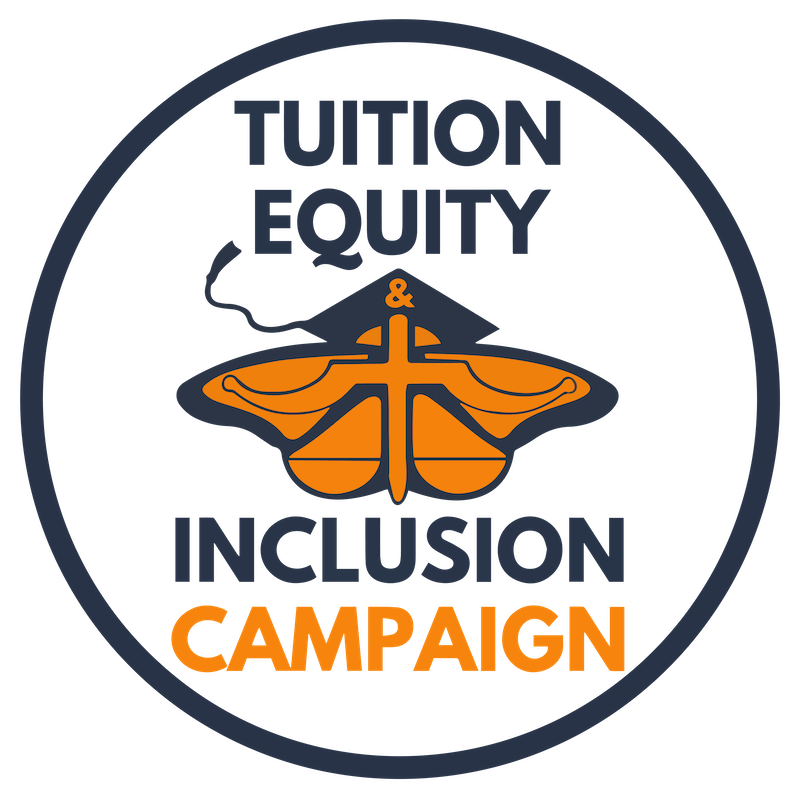
All graduates of Pennsylvania high schools should have equal opportunity to attend college, regardless of immigration status. Allowing all immigrant students equal access to higher education is likely to help address the falling enrollment at Pennsylvania State schools, community colleges, and private schools.
Get involved in PICC’s campaign to pass the tuition equity legislation by filling out the Campaign Interest form.
Benefits of Tuition Equity
- Tuition equity provides a way for hardworking students to continue their education. This policy ensures all students, including those with Deferred Action for Childhood Arrivals (DACA), Temporary Deferred Status (TPS), Deferred Enforced Departure (DED), H-4 Visas, undocumented, and refugee status who have attended Pennsylvania high schools have equal opportunity and incentive to finish high school and pursue higher education.
- Tuition equity policies have passed with broad bipartisan support in 22 states, and they have provided economic benefits to public colleges. Tuition equity policies do not provide free tuition; they simply allow all students who have lived in a state for years to pay in-state tuition rates. These policies increase college revenues because they enable students who otherwise would not be able to afford college to enroll at the in-state tuition rate.
- Tuition equity increases revenue for public institutions of higher education. A 2011 review of studies found that in-state tuition policies correlated with a 31% increase in college enrollments among undocumented students. Studies in Massachusetts and Texas show net gains in tuition revenue.

- Tuition equity has been found to be beneficial for state economies in the long-term. A Maryland study found that for each annual Maryland Dream Act cohort, the net long-term economic benefit to state, local, and federal governments would equal $24.6 million. Studies in Colorado, Hawaii, New Jersey, and New York also predicted that tax revenues would rise as a result of tuition equity policies.
- Students and their families contribute to Pennsylvania’s economy. In 2010 alone, families headed by unauthorized immigrants paid approximately $135 million in Pennsylvania state and local taxes. Tuition equity would maximize students’ potential to contribute back to society by becoming taxpayers.
- Pennsylvania needs to encourage population growth and reduce brain drain of young people. Nationally, Pennsylvania ranks fourth in percentage of the population age 65 and over. Our rate of growth is well below the national average. If Pennsylvania is going to stay economically competitive, it must implement public policies that welcome young people – many of which are immigrants – to the Commonwealth.
Recommendations for Tuition Equity Legislation
Legislation Must Ensure Equal Access to Higher Education for ALL Immigrant and Refugee Students.
- All students who graduate from a Pennsylvania
high school or attend two years of high school in Pennsylvania and receive the
equivalent of a diploma are eligible to receive in-state tuition rates at
community colleges, members of the Pennsylvania State System of Higher
Education, and private universities that receive state funds
- Extends in-state tuition to all students regardless of immigration status, including undocumented students, students with Deferred Action for Childhood Arrivals (DACA), Temporary Protected Status (TPS), Deferred Enforced Departure (DED), H-4 Visa holders, and refugee students
- Allow students to submit a wide range of documents to show Pennsylvania domicile
- Extend state-funded financial aid to all financially eligible students, regardless of immigration status, and provide an alternative application process from the FAFSA
- Ensure personal student information is protected and will never be shared with federal immigration authorities
